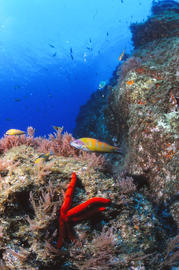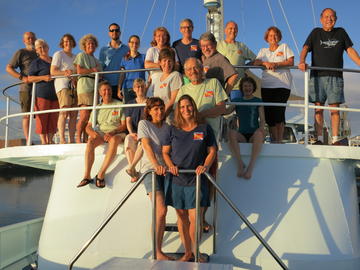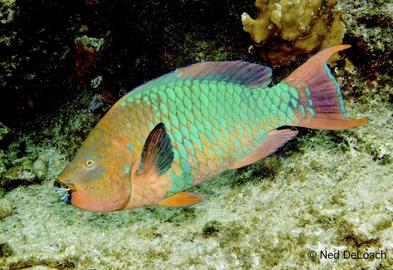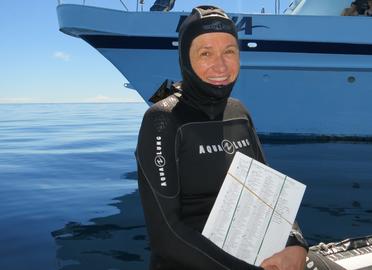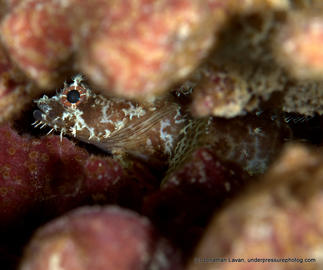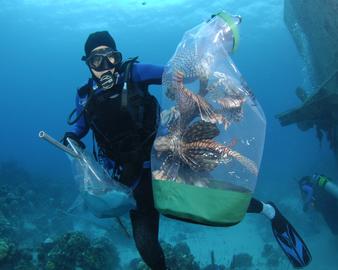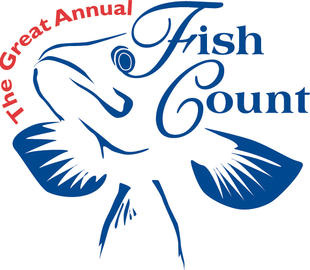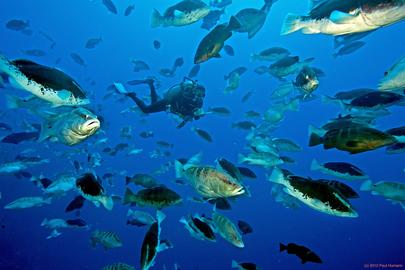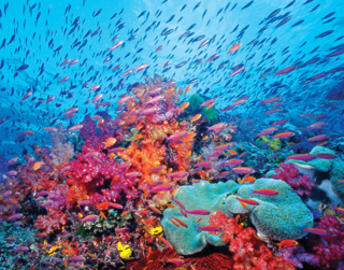We are excited to announce a new expansion of the Volunteer Fish Survey Project to the eastern Atlantic, beginning with a new program in the Azores. REEF's Director of Science, Christy Pattengill-Semmens, Ph.D., spent time in the islands earlier this summer developing new survey and training materials. This Portuguese archipelago is the northern extent of a bioregion known as Macaronesia, which also includes Madeira, the Canary Islands, and the Cape Verde Islands.
We are pleased to announce the 2015 REEF Field Survey Trip Schedule. We have an exciting lineup of destinations planned and we hope you will join us. These trips offer a great introduction to fish identification for novice fishwatchers, and are a fun way for experienced surveyors to build their life list while interacting with fellow fishwatchers. We are also offering two of the ever-popular Invasive Lionfish Research Expeditions. REEF staff, board members, and other REEF experts lead these trips, and each features daily classroom seminars and a full diving schedule.
Every month, scientists, government agencies, and other groups request raw data from REEF’s Fish Survey Project database. Here is a sampling of who has asked for REEF data recently and what they are using it for:
- Scientists from NOAA’s Office of Protected Resources are using REEF data to evaluate populations of seabass and grouper in the Caribbean.
- A scientist from the University of Washington School of Marine and Environmental Affairs is using REEF data on fishes and invertebrates to evaluate MPAs in the Puget Sound.
REEF members are at the heart of our grassroots marine conservation programs. Over 50,000 divers, snorkelers, students, and armchair naturalists stand behind our mission.
This month we highlight Janet Eyre. Janet has been a REEF member since 2002, and has conducted 1,125 surveys. She is on the Advanced Assessment Team as an Expert Surveyor in four of REEF’s regions! Janet happily describes herself as a true fish nerd, and she has taken a lead role in assisting with REEF’s expansions to the tropical western Pacific. Here's what Janet had to say about REEF:
There is one week left to DOUBLE YOUR DONATION, and we need $13,300 to reach our goal! Help REEF’s important marine conservation programs by donating to the largest matching campaign in our history. Please donate online today.
REEF’s recent Field Survey Trip to Belize was wonderful in many ways, but two events were of particular scientific interest. First, everybody’s favorite, the Sharpnose Pufferfish were spawning so there were literally hundreds seen on every single dive. More importantly, trip leader Jonathan Lavan got a photo of the rarely seen Glover’s Reef Toadfish (Vladichthys gloverensis) down in a sponge. It was thought to only live on Glover’s Reef, Belize, but this animal was photographed on an adjacent reef in Turneffe Atoll so perhaps a common name change is in order.
REEF staff co-authored a new publication in the scientific journal PeerJ that features research findings from our Invasive Lionfish Research Program. The paper, titled "Setting the record straight on invasive lionfish control: Culling works", evaluates the effectiveness of lionfish removal efforts. Frequent culling of the invasive Indo-Pacific Lionfish throughout the Caribbean has been shown to cause a shift towards more wary and reclusive behavior by lionfish, which has prompted calls for halting culls.
The 22nd annual Great Annual Fish Count (GAFC) is rapidly approaching! Will you be participating? We encourage local shops, dive clubs, and other groups to organize an activity anytime during the month of July (and often training events in June). You can view events already scheduled, and add your own, by visiting www.fishcount.org.
The documentary "Grouper Moon", produced by Miami public television station WPBT2's Changing Seas, recently wowed audiences and judges at the Reef Renaissance Film Festival in the US Virgin Islands. "Grouper Moon" was awarded the Neptune Award for Best in Show, and a 1st Place Black Coral award in the Documentary Short category. The episode focuses on the collaborative efforts of REEF and the Cayman Department of the Environment to study and conserve one of the last great populations of the Nassau Grouper.
Earlier this month, for World Oceans Day, the Curtis and Edith Munson Foundation and the Henry Foundation celebrated by pledging to match contributions to REEF this summer dollar for dollar, up to $45,000! Our campaign to raise funds for controlling invasive Lionfish, inspiring citizen science through the Volunteer Fish Survey Project, and protecting Nassau Grouper is off to a great start. But we still need your help to reach our goal in the next 40 days. If you haven't yet had a chance, please contribute today.

